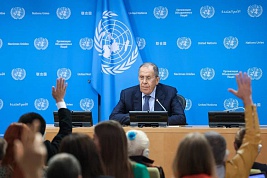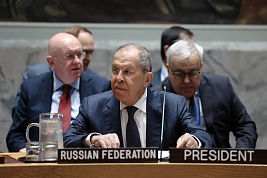RIA NOVOSTI INTERVIEW WITH ALEXANDER YAKOVENKO, AN OFFICIAL RUSSIAN FOREIGN MINISTRY SPOKESMAN, AHEAD OF JANUARY 10-11 MEETING OF HEADS OF GOVERNMENT OF BARENTS EURO-ARCTIC COUNCIL COUNTRIES
Question: Will you please describe the upcoming meeting in Norway of heads of government of Barents Euro-Arctic Council (BEAC) member-countries. Who will attend it?
Answer: The Council is to meet on January 10-11 at Kirkenes and will be timed to coincide with the 10th anniversary of the establishing of this regional organization. At the invitation of Norwegian Prime Minister Kjell Magne Bondevik, the function will be attended by heads of government of the Russian Federation, Denmark, Iceland, Finland, Sweden, and representatives of the country holding the European Union's rotating presidency (Greece) and of the European Communities Commission. The invitees also include heads of administrative-territorial formations of the member-countries belonging to the Regional Council of the BEAC (from Russia they are heads of the republics of Karelia and Komi, of the Nenets autonomous area, and of the Murmansk and Arkhangelsk regions).
Question: Could you give a glimpse of problems to be discussed at the meeting?
Answer: The aim of the Kirkenes meeting is to exchange, in an informal atmosphere, views on the full range of issues dealing with the promotion of cooperation in the interests of strengthening an atmosphere of stability and trust in inter-state relations by drawing on the mechanism of coordination existing between regional and subregional structures, and further developing Russia's bilateral ties with other Council members.
The agenda includes items concerned with expanded coordination in the region in the economic, energy, transport, ecological and social fields, in ensuring nuclear and radiation safety, and developing cross-border ties, healthcare, education and culture. Following the discussion it is contemplated to adopt a joint declaration.
Question: What significance does Russia attach to coordination of efforts within the framework of the Barents Euro-Arctic Council?
Answer: The Russian side views BEAC membership as one of the major aspects of its European policy. Over the ten years of its existence this organization has grown into a well-established and authoritative European structure, one of the effective mechanisms for multilateral cooperation in the North.
For Russia it is particularly important to put to use BEAC capabilities in building up partner-like relations with neighboring regions in the interests of promoting the social and economic development of the Russian North and Northwest, as well as solving a raft of ecological problems, including nuclear and radiation safety.
Such an approach by Russia is based on in-depth national interests whose implementation requires firm ties with European states over the entire spectrum of relations. International cooperation in the European North has at present transformed itself into a system of steady ties involving not only states, but also representatives of private business, political and public figures, inter-governmental organizations, and organizations of the indigenous people of the North. It is also the result and the generator of deep-going qualitative shifts in the European arena linked with the overcoming of the Cold War legacy. The region, once one of the frontiers of bloc-versus-bloc confrontation, is now growing a new fabric of coordination within the framework of a common democratic space.
In this sense, Barents cooperation really helps integrative processes in Europe, which are unfolding both on the basis of the European Union, and within the framework of EU cooperation with Russia.
Question: What is the program for a Russian delegation to the BEAC meeting?
Answer: In the course of his staying at Kirkenes, Russia's Prime Minister Mikhail Kasyanov plans to hold a series of bilateral meetings with his opposite numbers from North European countries. On January 10, Kasyanov is expected, together with Norwegian Prime Minister Kjell Magne Bondevik, to attend a ceremony of opening an updated checkpoint called Borisoglebsk-Storskog, on the Russian-Norwegian border. To our view, the implementation of the project to refurbish this checkpoint is a graphic example of the efficiency of bilateral cooperation in the interests of developing trade and economic ties and people-to-people contacts.


